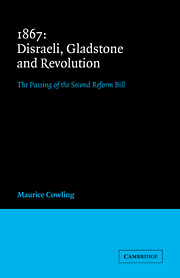Book contents
- Frontmatter
- Contents
- Preface
- Dedication
- Introduction
- I Prelude
- II Preliminary: The uprooting of the Whigs
- III The cornering of the Conservative party
- IV The reassertion of Conservative policy
- V The destruction of Liberal unity
- VI The victory of Disraeli
- VII The public agitation
- VIII The acceptance of Hodgkinson's amendment
- IX Conclusion: Palmerston's mantle
- Epilogue: The limitations of historical knowledge
- Appendixes
- Bibliography
- Notes
- Index
III - The cornering of the Conservative party
Published online by Cambridge University Press: 18 December 2009
- Frontmatter
- Contents
- Preface
- Dedication
- Introduction
- I Prelude
- II Preliminary: The uprooting of the Whigs
- III The cornering of the Conservative party
- IV The reassertion of Conservative policy
- V The destruction of Liberal unity
- VI The victory of Disraeli
- VII The public agitation
- VIII The acceptance of Hodgkinson's amendment
- IX Conclusion: Palmerston's mantle
- Epilogue: The limitations of historical knowledge
- Appendixes
- Bibliography
- Notes
- Index
Summary
‘The late government thought they had a sufficient majority, and they found their mistake. We know we have not…’
Derby to Pakington, December 4 1866. Derby MSS Box 193/1‘…a measure of Reform is indispensable. But you can, I am sure, construct one, extensive, safe and satisfactory.’
Shaftesbury to Derby, October 19 1866. Derby MSS Box 114‘We may have to meet a tortuous bill by a tortuous motion.’
Gladstone to Brand, October 30 1866. Brand MSSOut of the political crisis which lasted from June 19 when Russell offered his resignation until July 3 when Derby finally accepted office, neither a reconstructed Whig nor an enlarged Conservative party had emerged. Nevertheless, the four central contenders for political power—Disraeli and Derby, Gladstone, the Cabinet Whigs and the Cave—had all learnt much from the events through which they had passed in the nine months since Palmerston died.
Gladstone had learnt that he could not ride roughshod over all feeling in the Liberal party in the House of Commons. He had come to understand that, if the Liberal party was to be led, it had to some extent to be followed, and that in its present condition it could be neither followed nor led on the Reform question. At the same time, Gladstone had no desire to capitulate to either of its opposing factions. He knew, or thought, he could rely on 300 or so of the Liberals behind him who were neither Whig nor Radical, and that they would follow him so long as he seemed neither Radical nor Whig. He knew that some of the non-Cabinet Whigs and the Cave wished to stop him succeeding Russell, and that the sense of the party was not Whig.
- Type
- Chapter
- Information
- 1867 Disraeli, Gladstone and RevolutionThe Passing of the Second Reform Bill, pp. 119 - 151Publisher: Cambridge University PressPrint publication year: 1967



